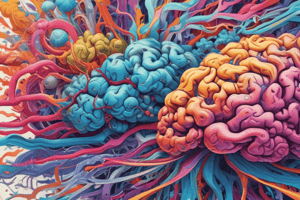Podcast
Questions and Answers
During adolescence, what significant changes occur in the brain?
During adolescence, what significant changes occur in the brain?
- Decluttering and refinement of neural networks (correct)
- Pause in brain development
- Decrease in neuron connections
- Increase in synapses
Why might adolescents struggle with impulse control and decision-making?
Why might adolescents struggle with impulse control and decision-making?
- Overactive synapses
- Ongoing brain pruning and rewiring (correct)
- Underdeveloped memory
- Lack of cognitive growth
What cognitive skills continue to develop throughout adolescence?
What cognitive skills continue to develop throughout adolescence?
- Decrease in problem-solving abilities
- Stagnation of critical thinking skills
- Halt in cognitive development
- Growth in creativity (correct)
Why might adolescents be more prone to risky behaviors like substance abuse during this phase?
Why might adolescents be more prone to risky behaviors like substance abuse during this phase?
What makes adolescents more vulnerable to misleading information, conspiracy theories, and pseudoscience?
What makes adolescents more vulnerable to misleading information, conspiracy theories, and pseudoscience?
How do emotional changes during adolescence influence teenagers?
How do emotional changes during adolescence influence teenagers?
What can contribute to stress and anxiety in adolescents?
What can contribute to stress and anxiety in adolescents?
Why is it important for adolescents to distinguish between reliable and unreliable sources of information?
Why is it important for adolescents to distinguish between reliable and unreliable sources of information?
What role do parents and educators play in supporting adolescents' development?
What role do parents and educators play in supporting adolescents' development?
What can adolescents gain from engaging with their communities?
What can adolescents gain from engaging with their communities?
Flashcards are hidden until you start studying
Study Notes
The Transition to Adolescence: Science, Brain Development, and Emotional Growth
As we delve into the topic of science with a particular focus on reaching the age of adolescence, it is essential to explore the subtopics of brain development, cognitive growth, and emotional changes that characterize this significant phase in our lives.
Turbulent Times: Adolescence and Brain Development
Adolescence, spanning from ages 10 through to around 19, is an important period of cognitive growth and brain development. The adolescent brain is undergoing significant changes, particularly in the areas of memory, decision-making, and emotion regulation.
Research has shown that synapses, the connections between neurons, are pruned and rewired during adolescence. This process allows for the decluttering and refinement of neural networks, which is crucial for learning and development.
However, as the brain undergoes such profound changes, adolescents can struggle with impulse control, decision-making, and emotional regulation. This is why they might be more prone to risky behaviors, such as substance abuse, reckless driving, and poor eating choices.
Cognitive Growth: Uncovering the Mystery
Throughout adolescence, cognitive skills such as problem-solving, critical thinking, and creativity continue to develop. This period of cognitive growth is vital for preparing teenagers for the challenges they will encounter in adulthood, including higher education and professional careers.
However, as cognitive abilities develop, so do susceptibilities to misinformation and cognitive biases. This can make adolescents more vulnerable to misleading information, conspiracy theories, and pseudoscience.
Emotional Growth: A Rollercoaster Ride
Emotional growth during adolescence is marked by intense feelings, mood swings, and a growing sense of self-awareness. As teenagers develop their identities, they may experience greater empathy, but also more sensitivity to criticism and emotional stressors.
The emotional changes that occur during adolescence are influenced by a complex interplay of hormonal, neurochemical, and environmental factors. The rise of cortisol, for example, can contribute to stress and anxiety, while the increase in dopamine and serotonin can enhance mood and motivation.
Adolescence and the Pursuit of Knowledge
As teenagers grapple with the cognitive, emotional, and social changes that accompany adolescence, they are also seeking to acquire knowledge in a variety of areas. These areas include STEM subjects, humanities, languages, and the arts.
In addition to traditional classroom learning, adolescents are increasingly turning to alternative sources of information, such as social media, online forums, and video content. This shift toward digital learning has brought both opportunities and challenges, as teenagers navigate the complexities of online communication and differentiate between reliable and unreliable sources of information.
Navigating Adolescence: Tips for Parents and Educators
As our children and students journey through adolescence, it is essential that we support their cognitive, emotional, and social development. To do this, parents and educators can take the following steps:
- Provide a safe and supportive environment that encourages open communication and fosters healthy emotional expression.
- Model positive behaviors, including critical thinking, empathy, and respect for others.
- Encourage adolescents to seek out a diverse range of sources of information, and help them to distinguish between reliable and unreliable sources.
- Engage adolescents in meaningful and challenging learning experiences that help them to develop problem-solving and critical thinking skills.
- Encourage adolescents to seek out opportunities to volunteer, participate in extracurricular activities, and engage with their communities.
In conclusion, reaching the age of adolescence is a time of profound change and growth. As teenagers navigate the cognitive, emotional, and social challenges that accompany this transitional period, parents and educators have an essential role to play in supporting their development. By fostering open communication, modeling positive behaviors, and engaging adolescents in meaningful learning experiences, we can help them to thrive as they prepare for the challenges of adulthood.
Studying That Suits You
Use AI to generate personalized quizzes and flashcards to suit your learning preferences.




